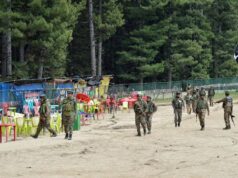Bad Planning By Department of Ex Servicemen Welfare Leads To Fund Crunch for ECHS
When the country was undergoing General Elections , it seems that Ministry of Defence in general and Ex Servicemen Welfare Department in particular had gone into a holiday mood. Due to sheer bad planning, enough money could not be allotted on Vote On Account for ECHS related expenditures.
This has led to such a budget crunch that there is not only an acute shortage of medicines for veterans of the armed forces and their families, but also no funds to pay the salaries of ECHS polyclinic staff.
These staff are contractual employees to whom as per contract wages must be paid on the last day of the month. However this has not been done for the month of June.
Then the Military Hospitals have not received enough funds to buy even the regular monthly medicines for issue to their dependent polyclinics.
Thus for the months of April , May , June and now July there has been severe shortage of regular daily medicines. when it comes to life-saving drugs for cardiac problems , cancer and nephrology related problems , there has been nil funds since April.
A very myopic rule framed last year by MoD in league with defence audit authorities prevents MH from issuing any medicine from stocks held for the Armed Forces, even on temporary basis.
Earlier this could be done and thus ECHS Polyclinics never faced any problem due to Vote On Account problems. Once the regular budget was received then book transfer balancing out was done.
The Ex-Servicemen Contributory Health Scheme (ECHS) on which around five million veterans and around 25 million families/ dependents are attached are now simply helpless and left to fend for themselves.
Due to bad planning the ECHS has been allotted between Rs 3,000 crore and Rs 4,000 crore only this year in spite of inflation. The vote-on-account budget is first spent on committed liabilities, such as payments for previous supply orders, which leaves insufficient funds for the present requirement of medicines.
“The vote-on-account budget is not adequate to meet the committed liabilities of the previous years such as medicine orders and even the requirement of medicines for the first three months of the financial year or until the full budget is passed. A bit of planning could have avoided all this.
However this was the time when some heavy tussle was going on between the Department of ESW and MD ECHS. Thus during this time no one bothered about the Ex Servicemen. Finally the MD Major General Ashok Kumar was eased out and posted to a new appointment within the Army and a new MD replaced him.
Due to the shortage in funds, fresh orders for the medicine supply chains of the three defence services — Army, IAF and Navy — have not been placed. Under the supply chains, the military hospitals across India procure the medicines and then supply it to the ECHS polyclinics.
The polyclinics too have a monthly expenditure limit ranging from Rs 1.5 lakh to Rs 2.5 lakh, depending on the Category of the Polyclinic which depends on the number of registered ESM.
This amount is for purchase of minor type of medicines not issued by MH. Generally it lasts for about 25 th of the month but since April it has been getting over by 12 th if the month only. So the plight of the patients may be imagined.
A new scheme of reimbursement has also been introduced. In this based on a Non Availability certificate from the Polyclinic , a veteran may purchase life saving Cancer and other drugs for 30 days at a time with monetary ceiling of 75000/- and submit the bills for reimbursement. For other medicines ceiling is 15 days at a time and up to 25000/-.
However, the paper work involved is heavy , the reimbursement process is long as polyclinics have neither the staff needed nor computers to do it. The medicines too can be very expensive and till date no imbursement has taken place.
Even empaneled hospitals usually in their prescriptions write specific brand names of medicines and not the generic ones as made compulsory by the Government, the Supreme Court and the Medical Council of India. Due to this, the military hospitals and the ALCs cannot provide alternatives to the medicines which have been prescribed.
The medicines then have to be procured from the hospital’s pharmacy by the patients themselves which can be very expensive. In addition some hospitals have also given inflated bills to the ECHS.
Army Chief General Bipin Rawat during a seminar this week said that ex-servicemen should be more careful about such bills and should ensure that do not sign blindly for things which have not been used.
Allotment of a mere 500 crores as additional amount as part of Vote On Account could have averted all this Departmental created crisis.
Imagine the resentment created by all this in 130 million dependent patients. Hope this was not done deliberately by some one during the crucial on going elections.
The Department of ESW needs a thorough overhaul.
About 25% of the staff should be civilians , 25% serving military personnel and 50 % should be recruited from the EX Servicemen themselves.The Secretary ESW should be a serving Lt General.
A major lacunae in the organisation is that those who have the responsibility to run the system smoothly have no authority and those with authority have no responsibility.




